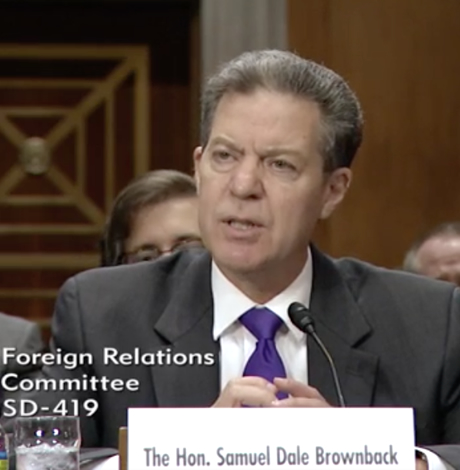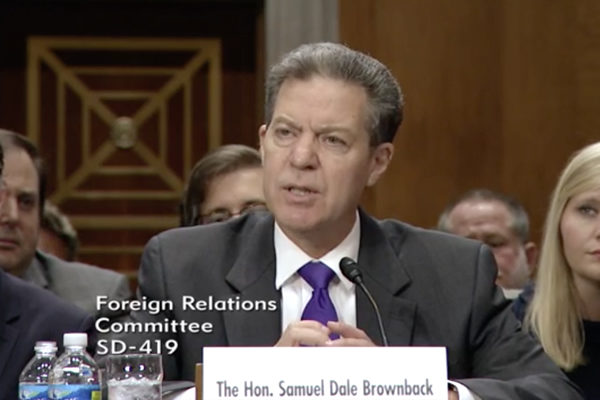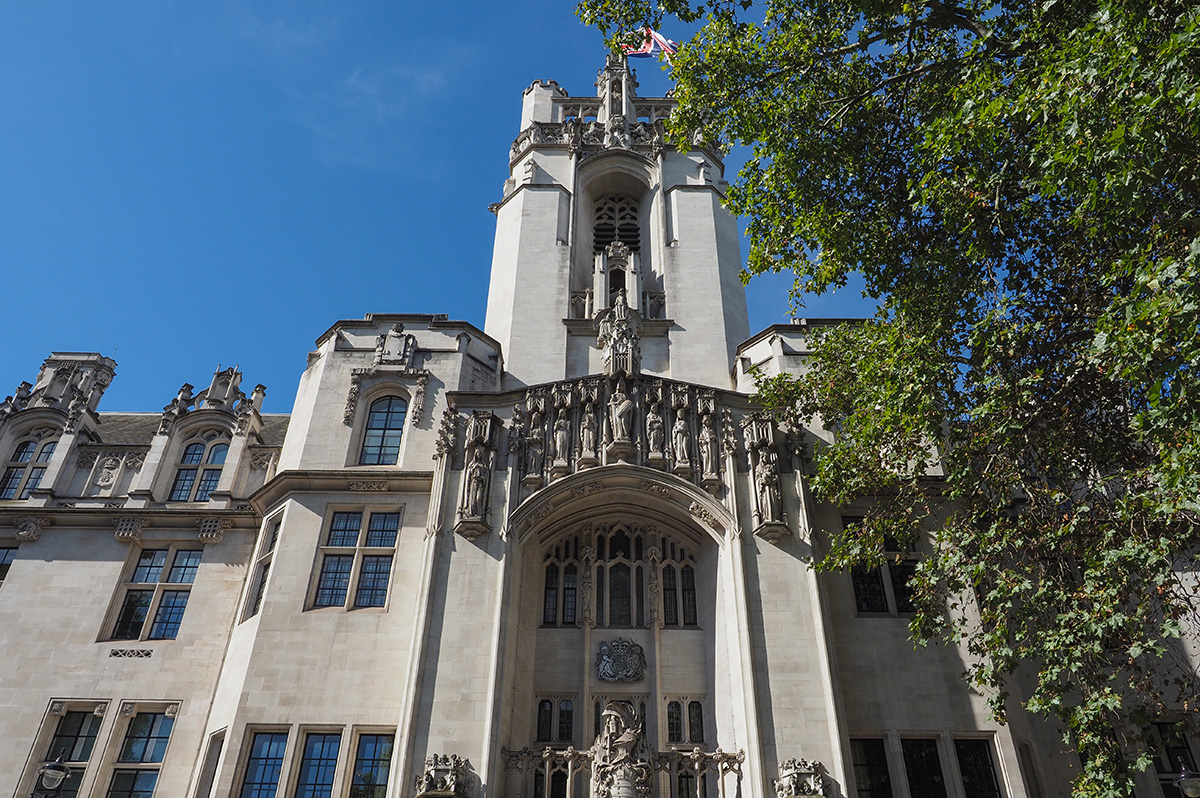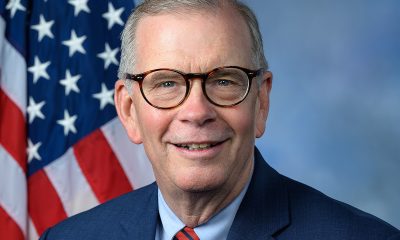News
Trump nominee refuses to say foreign laws criminalizing gays unjustified
Brownback nominated as U.S. ambassador for int’l religious freedom


Gov. Sam Brownback (R-Kansas), nominated as U.S. ambassador for religious freedom, speaks before the Senate Foreign Relations Committee on Oct. 4, 2017. (Screen capture public domain)
President Trump’s pick as U.S. ambassador for international religious freedom faced tough questioning Wednesday over his anti-LGBT record during which he refused to say laws in foreign countries criminalizing LGBT status were always unjustified.
Kansas Gov. Sam Brownback, whom Trump nominated in July to become U.S. ambassador at-large for international religious freedom, was non-committal on opposition to these foreign laws, which in some cases penalize homosexuality with death, under questioning from Sen. Tim Kaine (D-Va.).
Seeking to connect the issue of anti-LGBT discrimination to religious freedom, Kaine asked Brownback if he’s aware that countries have laws punishing homosexuality with imprisonment or death.
When Brownback replied, “I believe that’s correct,” Kaine pointed out the justification for these draconian anti-gay laws is religious reasons.
In response, Brownback said the day before his confirmation hearing, he had a “lengthy conversation” with Randy Berry, who continues to serve during the Trump administration as U.S. envoy for the State Department for international LGBT human rights issues, and how he worked with the Obama administration’s U.S. ambassador for religious freedom David Saperstein.
“We had a good conversation about how these two offices work together,” Brownback said. “I don’t see doing anything any different than what they worked together.”
Kaine started to reply, “That wasn’t really my question,” but Brownback responded, “But that really is the point.”
Seeking to get back on topic, Kaine asked the nominee if there’s any situation in which religious freedom could be used to justify laws imprisoning or executing people for being LGBT, but Brownback didn’t directly answer.
“I agree with what Randy Berry did around the world on that topic,” Brownback said. “I’m not fully briefed on the various specifics of what he basically did and described to me yesterday and the work he did back and forth with ambassador Saperstein, I wouldn’t see changing.”
With his question unanswered, Kaine asked again if there’s any circumstance in which criminalizing homosexuality for religious reasons is justified, but Brownback again declined to directly answer.
“I don’t know what that would be and what circumstance, but I would continue the policies that had been done in the prior administration in work on these international issues,” he said.
Kaine wasn’t satisfied: “I really would expect an unequivocal answer on that, but my time is up.”
Brownback refused to say outright laws criminalizing homosexuality are always unjustified days after the Trump administration faced criticism for voting against a U.N. resolution condemning the death penalty for homosexuality. The Trump administration defended that action by saying the resolution was about the death penalty in general, not specific to gays, and previous administrations declined to support similar resolutions.
The choice of Brownback as ambassador for religious freedom overseas has inspired consternation among LGBT rights supporters since Trump announced his choice based on the Kansas governor’s anti-LGBT record, which was explored during the hearing.
Brownback also faced tough questions from Kaine about rescinding as governor an executive order barring anti-LGBT discrimination in the state workforce.
Referencing Brownback’s decision in 2015 to reverse the order established by his Democratic predecessor Kathleen Sebelius, Kaine asked the nominee to defend his actions.
“That was an order that created a right by the executive branch that wasn’t available to other people and it wasn’t passed by the legislative branch,” Brownback replied. “I believe those sorts of issues should be passed a legislative branch.”
But Kaine wouldn’t have Brownback’s explanation the protections should be left the legislature, asking the nominee, “Isn’t that kind of the point to an executive order?”
“You issue an executive order on something that the legislature doesn’t pass,” Kaine added. “If it was clearly in statute, you wouldn’t need to issue an executive order.”
But Brownback said an executive order against anti-LGBT discrimination would be inappropriate because it was “a foundational issue that you were creating a right for state employees that wasn’t available to the rest of the people in the state.”
When Kaine replied “was it bad” to give state employees a course of action under anti-LGBT discrimination, Brownback insisted the state legislature should be responsible for those protections.
Kaine asked Brownback a series of questions on whether as Kansas governor he appoints Cabinet secretaries and agency heads, and the nominee more or less affirmed that was the case. When Kaine asked Brownback if he applies a high standard to state employees, Brownback replied “yes.”
Kaine’s follow up: Why then, as Kansas governor, could he also not protect LGBT state employees through executive order?
“If you’re hiring for honesty, if you’re hiring for competence, wouldn’t that be an appropriate thing that the governor as a chief of state personnel operation would want to know about leaders in state government,” Kaine said.
Brownback’s defense: “I think that would be a rational thing. I just don’t think it’s a right the executive branch should create without the legislative branch.”
Reversing the executive order isn’t the only anti-LGBT action Brownback took as governor. Last year, he signed into law a “religious freedom” bill allowing student groups at taxpayer-funded public universities in Kansas to deny membership to LGBT students.
As a member of Congress — first as U.S. House member, then as U.S. senator — Brownback built a significant anti-LGBT reputation. Among other things, Brownback championed a U.S. constitutional amendment that would have banned same-sex marriage.
Kaine recalled during his tenure as Virginia governor issuing an executive order against anti-gay discrimination in state employment, saying that was the first action he took as governor even though he faced resistance from then-Virginia Attorney General Bob McDonnell over the legislature not having acted on the issue.
“Can’t you see that the retraction of an executive order like this that had been in place for eight years sends a message that that is not a value, non-discrimination against folks on the grounds of sexual orientation, that’s not a value that you share?”
Brownback disagreed and insisted for the role at hand as ambassador for religious freedom, he wouldn’t engage in any kind of discrimination.
“I look forward to working with people, working with everybody regardless of their ideas or views on how we can advance the agenda of religious freedom,” Brownback said.
Also questioning Brownback on LGBT rights was Sen. Jeanne Shaheen (D-N.H.), who after raising the issue of Indonesian refugees in her state facing deportation asked Brownback if he’s willing to work with civil society groups working not just on religious freedom, but LGBT and women’s rights.
In response, Brownback insisted his focus will be religious freedom to maintain bipartisan support for that role.
“I will work with anybody that I can on the topic of religious freedom and not veer out of that lane because I think if you start to veer out of that lane, you get pulled to other topics that other people are charged with doing, you’re going to lose bipartisan support for the position, which is critical to have,” Brownback said.
Coming to Brownback’s defense was Sen. Marco Rubio (R-Fla.), who was chairing the hearing and said his colleagues were asking him about topics other than religious freedom.
“If there is persecution on the basis of religion, or oppression on the basis of religion, or the denial of liberty on the basis of religion, your job would be to advocate for that freedom for them to practice in peace religion in peace,” Rubio said. “That is the scope of the job that you’d been nominated to, is that correct, not to litigation theological points or policy differences beyond the scope of that liberty?”
Brownback affirmed that view and repeated his response that bipartisan support for his role is important, adding a distraction into other issues would make the position “less effective if effective at all.”
David Stacy, the Human Rights Campaign’s director of government affairs, said after the hearing his organization remains “deeply concerned” about Brownback’s nomination.
“Brownback’s long history of anti-LGBTQ actions in Congress and as governor was reflected in his refusal at his hearing today to unequivocally condemn the inhumane treatment, including execution, of people based on sexual orientation and gender identity,” Stacy said. “While he expressed some support for the LGBTQ human rights work at the State Department, his other responses give us every reason to believe that Brownback will continue to use his own narrow view of ‘religious freedom’ as permission to discriminate against LGBTQ people.”
U.S. Military/Pentagon
Pentagon urged to reverse Naval Academy book ban
Hundreds of titles discussing race, gender, and sexuality pulled from library shelves

Lambda Legal and the Legal Defense Fund issued a letter on Tuesday urging U.S. Defense Secretary Pete Hegseth to reverse course on a policy that led to the removal of 381 books from the Nimitz Library of the U.S. Naval Academy in Annapolis, Md.
Pursuant to President Donald Trump’s executive order 14190, “Ending Radical Indoctrination in K-12 Schooling,” the institution screened 900 titles to identify works promoting “diversity, equity, and inclusion,” removing those that concerned or touched upon “topics pertaining to the experiences of people of color, especially Black people, and/or LGBTQ people,” according to a press release from the civil rights organizations.
These included “I Know Why the Caged Bird Sings” by Maya Angelou, “Stone Fruit” by Lee Lai, “The Hate U Give” by Angie Thomas, “Lies My Teacher Told Me: Everything Your American History Textbook Got Wrong” by James W. Loewen, “Gender Queer: A Memoir” by Maia Kobabe, and “Democracy in Black: How Race Still Enslaves the American Soul” by Eddie S. Glaude, Jr.
The groups further noted that “the collection retained other books with messages and themes that privilege certain races and religions over others, including ‘The Clansman: A Historical Romance of the Ku Klux Klan’ by Thomas Dixon, Jr., ‘Mein Kampf’ by Adolf Hitler, and ‘Heart of Darkness’ by Joseph Conrad.
In their letter, Lambda Legal and LDF argued the books must be returned to circulation to preserve the “constitutional rights” of cadets at the institution, warning of the “danger” that comes with “censoring materials based on viewpoints disfavored by the current administration.”
“Such censorship is especially dangerous in an educational setting, where critical inquiry, intellectual diversity, and exposure to a wide array of perspectives are necessary to educate future citizen-leaders,” Lambda Legal Chief Legal Officer Jennifer C. Pizer and LDF Director of Strategic Initiatives Jin Hee Lee said in the press release.
Federal Government
White House sues Maine for refusing to comply with trans athlete ban
Lawsuit follows months-long conflict over school sports in state

The Justice Department is suing the state of Maine for refusing to comply with President Donald Trump’s executive order banning transgender athletes from participating in school sports, U.S. Attorney General Pam Bondi announced on Wednesday.
DOJ’s lawsuit accuses the state of violating Title IX rules barring sex discrimination, arguing that girls and women are disadvantaged in sports and deprived of opportunities like scholarships when they must compete against natal males, an interpretation of the statute that reverses course from how the law was enforced under the Biden-Harris administration.
“We tried to get Maine to comply” before filing the complaint, Bondi said during a news conference. She added the department is asking the court to “have the titles return to the young women who rightfully won these sports” and may also retroactively pull federal funding to the state for refusing to comply with the ban in the past.
Earlier this year, the attorney general sent letters to Maine, California, and Minnesota warning the blue states that the department “does not tolerate state officials who ignore federal law.”
According to the Maine Principals’ Association, only two trans high school-aged girls are competing statewide this year. Conclusions from research on the athletic performance of trans athletes vis-a-vis their cisgender counterparts have been mixed.
Trump critics and LGBTQ advocates maintain that efforts to enforce the ban can facilitate invasive gender policing to settle questions about an individual athlete’s birth sex, which puts all girls and women at risk. Others believe determinations about eligibility should be made not by the federal government but by school districts, states, and athletics associations.
Bondi’s announcement marked the latest escalation of a months-long feud between Trump and Maine, which began in February when the state’s Democratic governor, Janet Mills, declined to say she would enforce the ban.
Also on Wednesday, U.S. Education Secretary Linda McMahon said the findings from her department’s Title IX investigation into Maine schools — which, likewise, concerned their inclusion of trans student-athletes in competitive sports — was referred to DOJ.
Earlier this month, the Justice Department pulled $1.5 million in grants for Maine’s Department of Corrections because a trans woman was placed in a women’s correctional facility in violation of a different anti-trans executive order, while the U.S. Department of Agriculture paused the disbursement of funds supporting education programs in the state over its failure to comply with Title IX rules.
A federal court last week ordered USDA to unfreeze the money in a ruling that prohibits the agency from “terminating, freezing, or otherwise interfering with the state’s access to federal funds based on alleged Title IX violations without following the process required by federal statute.”
United Kingdom
UK Supreme Court rules legal definition of woman limited to ‘biological women’
Advocacy groups say decision is serious setback for transgender rights

The British Supreme Court on Wednesday ruled the legal definition of a woman is limited to “biological women” and does not include transgender women.
The Equality Act that bans discrimination based on sexual orientation and gender identity took effect in 2010.
Scottish MPs in 2018 passed a bill that sought to increase the number of women on government boards. The Supreme Court ruling notes For Women Scotland — a “feminist voluntary organization which campaigns to strengthen women’s rights and children’s rights in Scotland” — challenged the Scottish government’s decision to include trans women with a Gender Recognition Certificate in its definition of women when it implemented the quota.
Stonewall U.K., a British advocacy group, notes a Gender Recognition Certificate is “a document that allows some trans men and trans women to have the right gender on their birth certificate.”
“We conclude that the guidance issued by the Scottish government is incorrect,” reads the Supreme Court ruling. “A person with a GRC (Gender Recognition Certificate) in the female gender does not come within the definition of ‘woman’ for the purposes of sex discrimination in section 11 of the EA (Equality Act) 2010. That in turn means that the definition of ‘woman’ in section 2 of the 2018 Act, which Scottish ministers accept must bear the same meaning as the term ‘woman’ in section 11 and section 212 of the EA 2010, is limited to biological women and does not include trans women with a GRC.”
The 88-page ruling says trans people “are protected by the indirect discrimination provisions” of the Equality Act, regardless of whether they have a Gender Recognition Certificate.
“Transgender people are also protected from indirect discrimination where they are put at a particular disadvantage which they share with members of their biological sex,” it adds.
Susan Smith, co-founder of For Women Scotland, praised the decision.
“Today the judges have said what we always believed to be the case, that women are protected by their biological sex,” she said, according to the BBC. “Sex is real and women can now feel safe that services and spaces designated for women are for women and we are enormously grateful to the Supreme Court for this ruling.”
Author J.K. Rowling on X said it “took three extraordinary, tenacious Scottish women with an army behind them to get this case heard by the Supreme Court.”
“In winning, they’ve protected the rights of women and girls across the UK,” she added.
It took three extraordinary, tenacious Scottish women with an army behind them to get this case heard by the Supreme Court and, in winning, they’ve protected the rights of women and girls across the UK. @ForWomenScot, I’m so proud to know you 🏴💜🏴💚🏴🤍🏴 https://t.co/JEvcScVVGS
— J.K. Rowling (@jk_rowling) April 16, 2025
Advocacy groups in Scotland and across the U.K. said the ruling is a serious setback for trans rights.
“We are really shocked by today’s Supreme Court decision — which reverses 20 years of understanding on how the law recognizes trans men and women with Gender Recognition Certificates,” said Scottish Trans and the Equality Network in a statement posted to Instagram. “The judgment seems to have totally missed what matters to trans people — that we are able to live our lives, and be recognized, in line with who we truly are.”
Consortium, a network of more than 700 LGBTQ and intersex rights groups from across the U.K., in their own statement said it is “deeply concerned at the widespread, harmful implications of today’s Supreme Court ruling.”
“As LGBT+ organizations across the country, we stand in solidarity with trans, intersex and nonbinary folk as we navigate from here,” said Consortium.
The Supreme Court said its decision can be appealed.
-

 The White House5 days ago
The White House5 days agoWhite House does not ‘respond’ to reporters’ requests with pronouns included
-

 District of Columbia2 days ago
District of Columbia2 days agoReenactment of 1965 gay rights protest at White House set for April 17
-

 Hungary2 days ago
Hungary2 days agoHungarian MPs amend constitution to ban public LGBTQ events
-

 Maryland2 days ago
Maryland2 days agoFreeState Justice: Transgender activist ‘hijacked’ Moore’s Transgender Day of Visibility event











